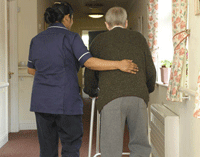
Poor staffing levels are undermining human rights in nursing homes by creating an “accepted indignity” in which residents are left wet or soiled for lengthy periods until staff become available.
That was the message from the Northern Ireland Human Rights Commission in a report which said the situation risked violating individuals’ right to physical and moral integrity and, in certain circumstances, their right to be free from inhuman and degrading treatment.
Its inquiry into human rights in nursing homes heard continence needs were only responded to at set times in some homes, and some residents were left to wear incontinence pads even when they could go to the toilet with assistance.
More generally, the inquiry found that staffing levels were “rarely set at a level that allows for more than minimum essential standards of care”, meaning that staff did not have time to interact meaningfully with residents and personal care was hurried.
It called on regulator the Regulation and Quality Improvement Authority’s guidelines on acceptable staff to resident ratios to be reviewed as a matter of urgency, and for staffing levels to be raised progressively over time.
The commission also found a lack of human rights training and awareness among staff and managers and called for specific training for staff in assessing capacity and maximising decision-making capacity among residents.
It also cited significant barriers to residents and families making complaints, and called for all residents to have access to professional advocacy in nursing homes.
The commission praised the commitment of staff, who it said were “devoted to working with older people” in a challenging environment, but said the Northern Ireland government needed to ensure that the “necessary structures and resources are in place to enable the staff to carry out their work in compliance with the international human rights standards”.
In response, health minister Edwin Poots pointed to the fact that nursing homes are inspected at least twice a year – twice as often as other services – and that the government had produced good practice guidelines for homes in 2010, which are “now in wide circulation”.
Image: Alamy
Go to You Care for the latest news and practice on residential and domiciliary care.
Enhance your safeguarding knowledge
Attend Community Care’s forthcoming conference on safeguarding adults at risk.
Related articles
Boost status of care staff and managers, says dignity inquiry


 ‘Dear Sajid Javid: please end the inappropriate detention of autistic people and those with learning disabilities’
‘Dear Sajid Javid: please end the inappropriate detention of autistic people and those with learning disabilities’ Ofsted calls for power to scrutinise children’s home groups
Ofsted calls for power to scrutinise children’s home groups Seven in eight commissioners paying below ‘minimum rate for home care’
Seven in eight commissioners paying below ‘minimum rate for home care’ Children and young people with SEND are ‘valued and prioritised’ in Wiltshire, find inspectors
Children and young people with SEND are ‘valued and prioritised’ in Wiltshire, find inspectors 
 Facebook
Facebook X
X LinkedIn
LinkedIn Instagram
Instagram
Comments are closed.